A Kenyan furniture maker is gunning to be the Ikea of Africa
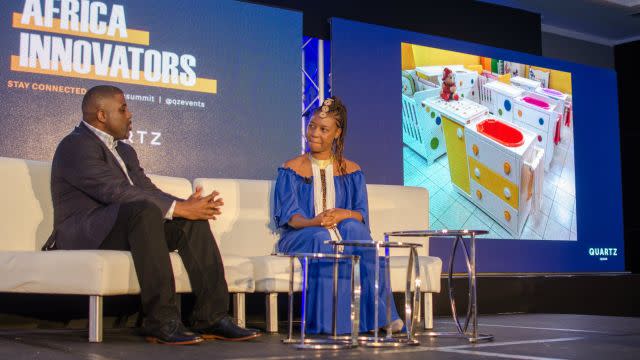
The furniture that comes out of Ciiru Waweru’s workshop in Nairobi isn’t hand painted or hand carved. The bunk beds, children’s desks, and baby cots made at Waweru’s children’s furniture brand, FunKidz, are more similar to what you would find at Ikea—flat-packable, made with computer-controlled cutting machines and printers.
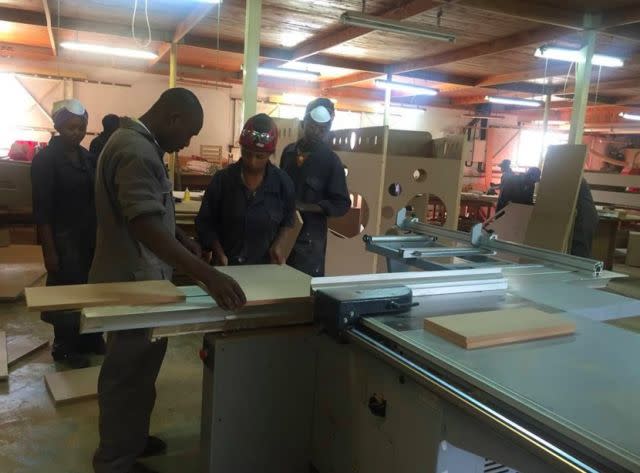
“People say [the furniture] doesn’t look ‘African’ enough,” Waweru said, speaking at the Quartz Africa Innovators summit on July 20.
“We need to stop putting things in a label, in a box, and saying this isn’t African enough… What does that even mean? Through our design and products we hope to bridge that stereotype gap… where you look African and therefore your furniture must also look African,” she said.
Waweru came up with the idea of FunKidz while she and her husband were expecting their first child and found it difficult to find quality children’s furniture in Nairobi. The couple started the company in 2010, with two employees and not much cash. Now, the company employs 23 people and sells in Kenya, Rwanda, and Uganda.
The furniture she is fun, colorful, and designed to foster creativity. To see how children respond, she watches her own two kids, who she refers to as her heads of research and development, play on the furniture.
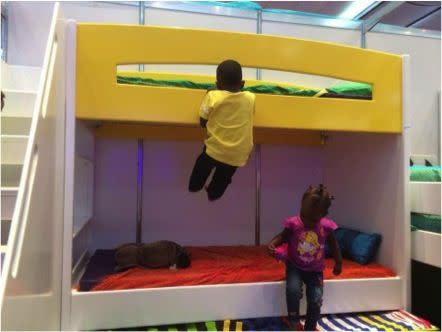
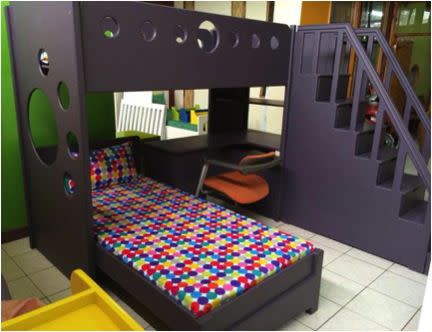

Waweru is using the company to reshape several narratives about goods made in Africa. Chief among them is the idea that a country like Kenya, where she is from, can only produce small-scale items—pottery, crafts, accessories—not products that can be manufactured en masse and sold all over the world.
East Africa’s largest economy was once home to a promising manufacturing center for textiles, garments, tobacco, food, and beverage. Thanks to a series of foreign exchange crises, policies that encouraged businesses to focus less on exports and more on a limited domestic market in the 1970s, and poor macroeconomic policies (pdf) throughout the 1990s, the sector has failed to recover.
Today, manufacturing accounts for just 10.6% of GDP, a figure that hasn’t budged for the past five years, according to the Kenya Association of Manufacturers. By contrast, agriculture contributes 30%. In 2008, policymakers set a goal of raising the sector’s contribution to the economy to 20% by 2030 as part of the 2030 Vision development plan to elevate Kenya from a developing country into a middle-income economy.
That will be difficult. Most businesses in the manufacturing sector are small, funded by loans from family members and friends. They invest little in their businesses, having to spend much of their money on things like water, electricity, security, and transport, according to a 2014 paper by the Kenya Institute for Public Policy Research and Analysis Schools and the Brookings Institution.
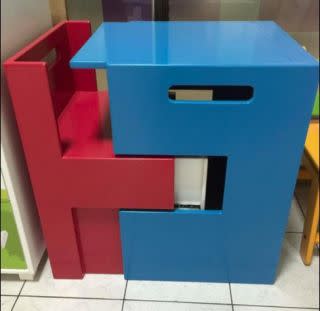
Waweru credits a Goldman Sachs entrepreneurship program called 10,000 Women for giving her a leg up in a tough market. She streamlined her process with a favorable loan that allowed her to purchase a computer-controlled cutting machine and paint printers.
“Manufacturing on the continent is not there yet because we don’t actually adopt technologies,” she said. “When we say we manufacture kids furniture, [people] imagine teddy bears. They don’t imagine that we can be as big as Ikea. ”

Motioning around the room during the Quartz event, Waweru said, “The light switches, the lightbulbs—none have been made on the continent, and I think that’s extremely embarrassing and we should be ashamed of ourselves and change that narrative.”
For that reason, Waweru holds weekend sessions teaching children how to make everything from lightbulbs to laser tripwire and intruder detectors—technology she says is especially important in Nairobi where security is a common concern. The program, Kidz Go Tech, was noted by US first lady Michelle Obama in June during a summit recognizing female entrepreneurs in Africa and the Middle East.
“The children themselves can be the ones who upgrade those homes and have better security, and have their own solar panels, which they can learn to make,” she said. “We teach kids to answer their own questions and be the solution providers for our own problems.”
Sign up for the Quartz Africa Weekly Brief — the most important and interesting news from across the continent, in your inbox.

Sign up for the Quartz Daily Brief, our free daily newsletter with the world’s most important and interesting news.
More stories from Quartz:

 Yahoo Finance
Yahoo Finance 